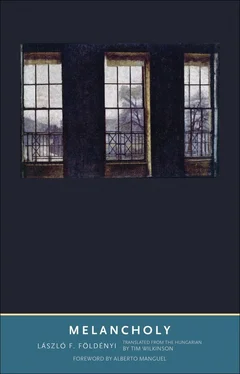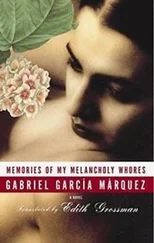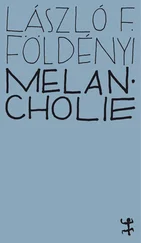After all, how many things are there in nature for which we have no appropriate words? How many other things are there which have names yet whose full merit cannot be expressed by human eloquence before we actually experience them? How many times have I heard you complain, how many times have I seen your silent indignation, when neither tongue nor pen could express thoughts that existed easily and with the greatest clarity in your mind? Of what use, therefore, is this eloquence of yours, so narrow and fragile that it cannot embrace all things and cannot hold together what it has embraced?
(73)
The modern melancholic has a positive aversion for language: for one thing, language, talking, attempts to objectify melancholia, even though there is no special object to which melancholia could be tied; for another, by giving things a name, language forces melancholia into existing patterns of the world, although it is precisely due to that world that he suffers. To rid himself of his own melancholia, Thomas Browne preferred to put on the blinkers implied by words when he wrote: “I thank the goodness of God, I have no sins that want a name; I am not singular in offences; my transgressions are Epidemical” (
Religio Medici
, pt. 2, sec. 7). Community in sin allays a guilty conscience, and if a name is found for the transgression, then the transgressor is also a member of a society that we know will, sooner or later, albeit not reassuringly, smooth everything over. The true melancholic, however, can find no words for his condition: it is not possible to speak satisfactorily about death, and therefore not about the fear of, or wish for, death either. Language reassures us, while there is nothing less reassuring than death. The fine arts have a better chance than language, though even they are too strongly bound to the objective world; they had a major role in evoking melancholia in the Renaissance, when the objective world was not yet alien but considered to be conquerable. But when the world did not offer the melancholic the possibility of establishing a home, and he was surrounded ever more threateningly by objects, the role of music grew, and — lacking in all objective reference as it does — it became the most melancholic of all the genres of art.
The connection between music and melancholia was known in all ages (it speaks volumes that in ancient times, music and augury, which was related to melancholia, were thought to share the same origin; to the mythological mind, music was the basis of life, and without it nothing at all could be perfect), but earlier that connection was external: music per se was not melancholic but a remedy (or poison) for melancholia. “And it came to pass, when the evil spirit from God was upon Saul,” the Bible recounts about Saul’s melancholia, “that David took an harp, and played with his hand: so Saul was refreshed, and was well, and the evil spirit departed from him” (1 Samuel 16:23). According to Asclepiades of Bithynia, a famous Greek physician, a therapy for melancholia had to include tunes in the Phrygian mode; Galen explicitly recommended that melancholics listen to music — and that was also avowed throughout the Middle Ages. 11A medicine, however, was supposed to act on the body by being akin to — indeed, to some extent identical with — it; music was a cure for melancholia, which implied that a melancholic nature was also characteristic of it. Receiving more than the prescribed dose of this medicine was poisonous; if, on the one hand, music was a medicine, because it represented cosmic order ( musica mundana —music of the spheres), on the other hand, it was potentially poisonous and a harbinger of death (siren song); it could ennoble, but it could also corrupt, because, as Plutarch professed, it could be more intoxicating than wine. “Truly,” Jean Starobinski quotes Soranus from the beginning of the second century CE, “music causes plethora in the head, which may be experienced even in the case of healthy people: in certain cases it is thought it may evoke madness; when those who are inspired sing their prophesies, it may seem as if a god had taken possession of them” (Starobinski, Histoire du traitement de la mélancolie des origines , 73). Linking music with madness and augury shows that music too was connected with understanding existence: when it is a medicine, it aids the understanding of existence, but when it is a poison, it inhibits such understanding and spreads gloom around. Music can embrace everything, and on hearing it one sees the world from a different angle from before: music not only sets the mood of its listener, but makes him reinterpret existence itself. Starobinski cites the Spaniard Ramos de Pareja, who in 1482, in a book entitled Musica practica , matched four primary pitches to the four humors and their planets: the tonus protus: phlegm, the moon; the tonus deuteros: the bile, Mars; the tonus tritus: blood, Jupiter; the tonus tetartus: melancholia, Saturn. Music was ubiquitous, extending its influence over everything; if, in the Middle Ages, God accepted responsibility for existence, then music could not be melancholic. With the decline of the Middle Ages, however, when everything depended on man, now abandoned to himself, music was also left to itself; instead of divine harmony, the voices of temperament were intoned. Following the Renaissance, music became intimately melancholic, and from then on it was regarded less and less as a medicine. A medicine can be recommended only if one can differentiate between sickness and health, if there is a standard for comparing the two kinds of condition. For melancholics of the Renaissance and the modern era, this absolute standard was lost, starting with God taking a step back and handing the mortal joy of self-determination to humans, and ending with sickness and health becoming — just as seventeenth-century thinkers proclaimed they would — relative concepts — in fact, with everything being determined by illness. But if the whole world is sick, then it is vain to hope to find a remedy — and the melancholic, while fearing and wishing for death simultaneously, does not even seek to be cured, since that would push him back into the old routine of an earlier state, shove him into the arms of the world, render his position unequivocal (albeit just as hopeless as in his melancholic days). Now music is no longer a medicine; 12it is useless for restoring an upset balance, but since everything has been shaken, it acts disruptively: it does not mediate a single external order for the benefit of the listener, but instead becomes hopelessly subjective, representing a mental state but not the world. A melancholic can have no hope of a remedy; he cannot trust anything, can count on only himself and compare music, the equivalent of wordless melancholia, to himself. Music no longer changes but preserves the existing condition. “I damn the melancholic inclination,” Ficino writes in a letter to Cavalcanti, “for me it is exceedingly bitter unless it is mellowed and sweetened through frequent use of the lute” ( Epistolae , vol. 3, no. 24). 13Music sweetens melancholia, that is, the melancholic genuinely finds himself in music.
In 1737, the queen of Spain invited Farinelli, the celebrated singer, to sing for Philip V, who suffered from deep melancholy. Farinelli, himself a melancholic, cured the king with his singing the first time he performed for the monarchs; as a result, “it was determined that he should be taken into the service of the court,” and “for the first ten years of his residence at the court of Spain, during the life of Philip the Vth, he sung every night to that monarch” (Charles Burney, The Present State of Music in France and Italy , 218). In the modern age, melancholia was not a subject of music, but rather permeated it. From the Baroque onward, musical compositions about melancholia — which have an external and “rhetorical” rather than fateful relationship to it — are perhaps less melancholic than works in which melancholia is not brought out at all as a subject. 14Melancholia does not tolerate objective definition (that is why its true medium is music), and if music is “about” anything at all, it is about there being no point in the world in relation to which one might define, or make, one’s position unequivocally. The modern melancholic, fraught with tensions and, at the same time, infinitely resigned, makes his appearance in the company of music: John Dowland’s collection Lachrimae, or Seaven Teares , Gesualdo’s madrigals, Monteverdi’s music for the stage, and Purcell’s operas and choral works alike articulate melancholia — and one does not need to strain too much to hear in these works the later tones of Schubert or Schumann, Mahler or Wagner, Satie or Webern, Giacinto Scelsi or John Cage or even Klaus Nomi. There is no sense in assembling a list of names: the music of the modern age is not melancholic because it spreads a doleful mood, but because it was created in the form of music . Whether sorrowful or cheerful in mood (how meaningless that distinction is, as if profound cheerfulness and inconsolable sorrow did not spring from the same stock!), music, from the Baroque onward, has had only a single true topic: the homelessness and the fateful-seeming abandonment of the modern melancholic. “Music,” writes Bruno Walter, “is no daytime art; it does not yield its secret roots or its ultimate depths to the unshadowed soul. It comes out of the dark, and must be understood and felt in the dark; it is akin to the somber heave of the ocean, not to the clear blue of the Mediterranean” (Walter, Gustav Mahler , 121). Or turning for help to Céline, who experienced the melancholic’s fear of and desire for death more than anyone, and therefore was truly sensitive to music as well: “Nobody can really resist music. You don’t know what to do with your heart, you’re glad to give it away. At the bottom of all music you have to hear the tune without notes more just for us, us all, the tune of Death” (Louis-Ferdinand Céline, Journey to the End of the Night , 264).
Читать дальше












